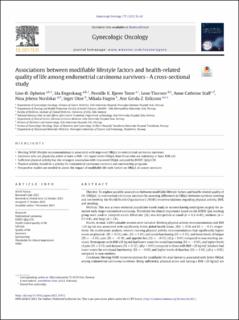Associations between modifiable lifestyle factors and health-related quality of life among endometrial carcinoma survivors - A cross-sectional study
Opheim, Linn Ø.; Engeskaug, Ida; Trent, Pernille Kristina Bjerre; Thorsen, Lene; Staff, Anne Cathrine; Nordskar, Nina Jebens; Utne, Inger; Hagen, Milada; Eriksson, Ane Gerda Zahl
Peer reviewed, Journal article
Published version
Permanent lenke
https://hdl.handle.net/11250/3113472Utgivelsesdato
2023Metadata
Vis full innførselSamlinger
Sammendrag
Objective. To explore possible associations between modifiable lifestyle factors and health-related quality of life (HRQoL) in endometrial carcinoma survivors by assessing differences in HRQoL between survivors meeting and not meeting the World Health Organization's (WHO) recommendations regarding physical activity, BMI, and smoking.
Methods. This was a cross-sectional population-based study in women having undergone surgery for as- sumed early-stage endometrial carcinoma. Thresholds for clinical importance based on the EORTC QoL working group were used to interpret scores. Effect size (ES) was interpreted as small (d = 0.2–0.49), medium (d = 0.5–0.8), and large (d > 0.8).
Results. In total, 1200 evaluable women were included. Meeting physical activity recommendations and BMI <25 kg/m2 was associated with significantly better global health status, (ES) = 0.18 and ES = −0.11, respec- tively. On multivariate analysis, women meeting physical activity recommendations had significantly higher scores on physical- (ES = 0.31), role- (ES = 0.15), and social functioning (ES = 0.15), and lower levels of fatigue (ES = −0.16), pain (ES = −0.10), and appetite loss (ES = −0.15) (all p < 0.05) compared to non-meeting sur- vivors. Participants with BMI ≥25 kg/m2 had lower scores for social functioning (ES = −0.10), and higher levels of pain (ES = 0.13) and dyspnea (ES = 0.12) (all p < 0.05) compared to those with BMI <25 kg/m2. Smokers had lower scores for emotional functioning (ES = −0.09) and higher levels of diarrhea (ES = 0.10) (all p < 0.05) compared to non-smokers.
Conclusion. Meeting WHO recommendations for modifiable life-style factors is associated with better HRQoL among endometrial carcinoma survivors: Being sufficiently physical active and having a BMI <25 kg/m2 are significantly associated with better self-reported global health status. All modifiable factors are associated with better functioning, and reduced symptom-burden.

